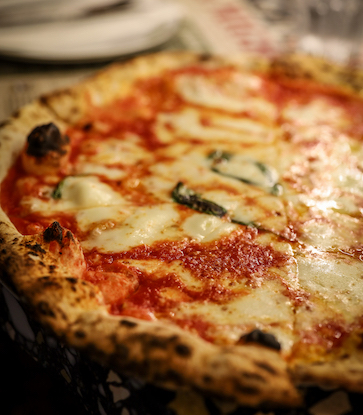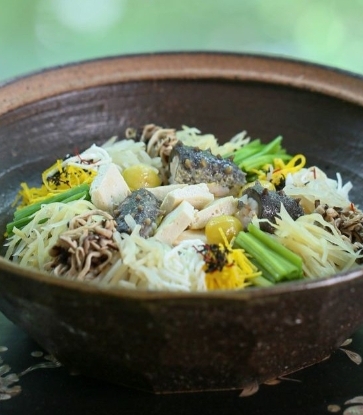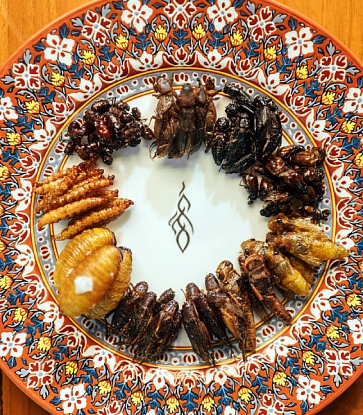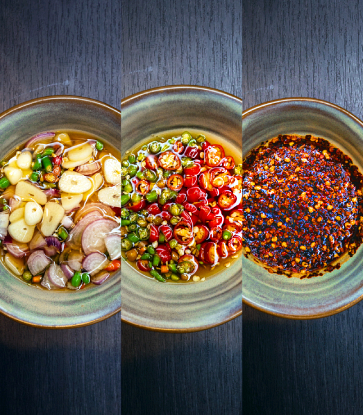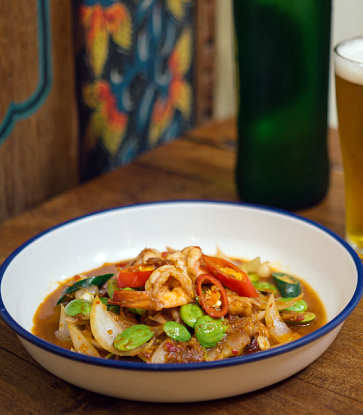For meat lovers, the seductive crunch of crackling pork skin makes the mouth water every time. It makes no matter whether that crispy pork belly we find at street vendors all over Thailand descended from siu yuk (燒肉), Cantonese roasted pork belly. Roasted until crunchy, seasoned perfectly with salt and spices, every flavourful bite combines crispy skin, the right amount of fat, and tender, succulent meat.
Crispy pork belly has become a beloved favourite among customers at street vendors and local eateries. You can find it simply served over rice, in guay jab (a rice noodle soup dish), or fried with basil into a kaprao. All brimming with mouthwatering deliciousness. During the lockdowns, it became such a popular comfort food that people across the country tried their hand at making it.
If you had a go and succeeded in tastiness or tried until you gave up and put that air fryer back in its box, no matter. We’re uncovering the secrets to the most satisfying crispy pork from the pages of MICHELIN Guide Thailand 2022. We’ve got Chef Qiu Xiaogui from Yu Ting Yuan, which, after being open just a year, became the first Chinese restaurant in Thailand to receive one MICHELIN Star. And there’s Werapat "Pong" Kornchaijirajed, the third-generation owner of Bib Gourmand recipient Guay Jab Mr. Jo, a cherished local favourite for over 70 years.

What makes crispy pork belly so enticing?
Kornchaijirajed: Probably the crunchiness, the fattiness, the tender meat, and the aroma. But mainly, the crunchiness. Good crispy pork belly has puffed up skin that’s crispy, not hard. Crispiness is different from hardness. If it’s cooked until hard, it will look dry.
Chef Qiu: It’s about that perfect bite. What also makes it delicious is the ingredients. The pig can’t be too big, about 19 kg is good. Then there’s the detailed process to make the skin crispy, the meat juicy, and everything tasty. Sometimes the skin can look crunchy, but you end up biting into a mouthful of fat. That’s because you didn’t take enough time to prepare the pork. The skin may crisp up nicely, but it is too oily and not tasty at all.
What makes your crispy pork belly special?
Kornchaijirajed: Our crispy pork belly is puffy and crackling, while the meat is tender and moist, fragrant from the marinade seasonings. The pork’s freshness is key, because if it isn’t fresh, it will smell. That’s why we only use fresh ingredients that we get every day. We select pork belly cuts with the least amount of fat. We remove the hairs, clean it, boil it until just cooked, and marinate it. Then we dry the belly as much as possible. The drying means crispier skin. We also cut grooves and make holes in the skin, allowing the seasonings and oil to permeate better. And we use pig lard for frying. All these steps lead to experience in frying. You look at the heat, then check the skin’s colour to see if it’s ready or not. It’s all about the experience. Is frying difficult? Not really, but it does depend on your experience. If you do it every day, you can become a master.

Chef Qiu: It’s all about the chef’s skills. Our chef has been making this since he was 15, so that’s almost 30 years now. He can tell right away if the ingredients are good enough. And he can take the heat from standing in front of a hot stove all day, making our fantastic crispy pork belly.
The pigs we use are not too big or too small. We use the belly section nearest the ribs. You have to make sure there are five layers: skin, a little fat, then meat, then fat, and then meat. This is what gives you juiciness. We soak the pork in water for about 20 to 25 minutes to wash away excess fat. Then we steam it for about 15 to 20 minutes until it’s about 70% done.
After that, we take it out of the water and poke holes in the pork with a needle and then rub it all over with salt and spices. Then we air dry it with a fan for 12 hours.
Drying is an important step. Otherwise, the skin won’t crackle when you barbecue it. We don’t fry, we barbecue. At 400°F for 75 minutes. Every 10 or 17 minutes, the chef will take the pork belly out and scrape the top, then put it back. He’ll do this about five times. This is where experience is important. He knows if it’s crispy enough by the sound it makes. Another thing is the difference between Thai and Chinese crispy pork belly – Thais fry the pork in oil to make it crispy. The traditional Chinese way is to barbecue, either over gas or wood fire, for that full crunch.

What are your tips for delicious crispy pork belly?
Kornchaijirajed: I don’t know if this is any different from others, but the real secret is in watching the heat, looking at the skin and being able to tell that it is ready. The timing and the heat have to be just right. Otherwise, the outside might look good, but the inside is still raw. If the heat is too high, the skin will get rock hard, along with the meat. That’s why we use medium heat when we fry. And don’t forget to dry the pork as much as possible first. The drier it is, the crispier the skin. If not, it’ll get really thin, really hard. The other thing is the heat. Some people like using air fryers. But then it comes out more like roasted pork. If you like crispy, crackling skin, frying is the best option.
Chef Qiu: First, you need fresh pork and ingredients. The second important thing is the marinade. I recommend five-spice powder and salt. Combine it well and cover the pork thoroughly. At this point, I would say it would be easier to go eat it at a restaurant (laughs). Thirdly, you have to watch the cooking temperature. Too hot, it will burn. Not hot enough, it won’t crisp up. If you can’t control these three things when cooking at home, the pork won’t be good.
If you’re experienced and want to try this at home, select a good pork belly cut and wash it well. Then steam it until 70% cooked before drying it to get ready for the barbecue. To do this, you should have a separate room with a fan to air dry the pork for 12 hours so that it is as dry as possible. You shouldn’t do this in a refrigerator because dryness is key. That’s why fan drying is the best method. Then it all comes down to the barbecuing. You have to keep scraping the skin. Otherwise, it might be crispy, but not our crispy pork belly crispy.
Another secret is, if you don’t have five-spice powder, it’s okay. If you like it salty, then just use more salt. But don’t use something like soy sauce, because the pork must be dry.

Words of warning when making crispy pork belly at home?
Kornchaijirajed: Be very careful with the oil. It will splash, but how much depends on how well you dried the pork during your preparation. Once done, try to avoid keeping the crispy pork belly in a damp place. This will soften the skin. Don’t place it in a closed or stuffy place. You should place it somewhere ventilated, at room temperature. If you want the pork warm, I recommend using an air fryer. Or, you could refry it. Use medium heat like before, but fry for a lot less time. But the best way is to eat it right away for optimal deliciousness.
Chef Qiu: Make sure the heat is at 400°F. No more, no less. This is very hot, so that is why you need to take the pork out every 10 or 15 minutes for about five times. Or else it will burn. This may seem complicated, but this is way, our crispy pork belly stays crunchy longer. You can reheat it in the microwave; it stays crispy for days.

What goes best with crispy pork belly?
Kornchaijirajed: Personally, I like phad kaprao. But at the restaurant, we serve it with sweet soy sauce. Eaten with rice, it is delicious. The sweet soy sauce we use is an original recipe from my grandfather’s time. The sweetness helps cut the fattiness of the pork.
Chef Qiu: It’s delicious with a little salt. Or mustard. In China, some people dip it in sugar to cut the fat. At Yu Ting Yuan, we have a homemade mustard sauce that’s a little sweet. But if the crispy pork belly is done right, you don’t need anything else.





